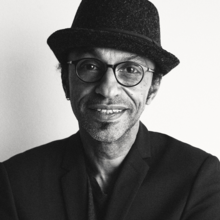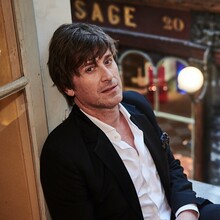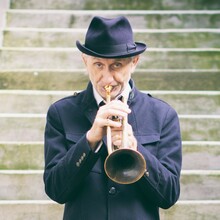Drums
Classically trained at the Conservatoire National Supérieur de Musique de Paris, Manu Katché was originally destined for a noble career as a percussionist in a symphony orchestra. This is probably one of the reasons for the "Katché sound" that makes his drumstick stroke so recognizable among music lovers. A magic stroke that would lead him away from classical music and into jazz and pop-rock. He soon found himself playing on stage and in the studio, alongside French greats such as Goldman, Souchon, Chedid, Catherine Lara and Michel Jonasz, but he owes the explosion of his career to Peter Gabriel, who asked him to play drums on his album « So ».
Some musicians refuse to be pigeonholed, at the risk of upsetting even the most timid. This is Manu's privilege, as he is capable of mixing all influences and adapting to all styles.
Immediately, the distinctive sound of his drums brought him to the attention of pop-rock stars, opening the doors to international studios and stages. He went on to record for Joni Mitchell, Sting, Dire Straits, Tears for Fears, The Christians, Robbie Robertson, Joan Armatrading, Paul Young, Tracy Chapman, Youssou N'Dour, Pino Danielle, Simple Minds, Joe Satriani and Richard Wright, without neglecting his French-speaking comrades in between, with Véronique Sanson, Francis Cabrel, Laurent Voulzy, Stephan Eicher and Michel Petrucciani...
As far as official recognition is concerned, things are going well: first Victoire de la Musique for "Best arrangements" in 86, second Victoire in 87 for "Best studio musician"; crowned "Best coming up drummer of the year" the same year by "Modern Drummer", he won his third Victoire de la Musique in 1996 for the soundtrack to the film "Un Indien dans la ville". In '96, he received an award from the Montreal Drum Festival, and in 2004, the French Minister of Culture made him a Chevalier des Arts et Lettres. Lastly, his musical creation for the Musée Grévin and soon his wax effigy confirm the fame of the authentic character that is Manu Katché.
Hailed and rewarded as an exceptional musician and talented composer, he has never abandoned his first love: jazz. This is evidenced by the creation of his group "Manu Katché Tendances" in 2004, with which he embarked on international tours, and his appetite for the "Nordic jazz" of Norwegian saxophonist Jan Garbarek with his album, "Neighbourhood" in 2005, released by Manfred Eicher's legendary label: ECM Records. His next album, "Playground", was released by ECM/Universal in 2007, while "Third Round" was released in March 2010 (also by ECM/Universal). Manu's latest opus, simply entitled "Manu Katché", is released on October 29, 2012 (ECM/Universal).The line-up changes with each tour.
From 2007 to the end of 2010, Manu Katché hosted "One Shot Not" on Arte every Thursday around 11pm. At the end of March 2010, he presented a new show, "Musicalities", on France Inter from 10pm to midnight.
In 2012, Manu takes back the drumsticks on the "So" anniversary tour with Peter Gabriel. In 2013, he released "Roadbook", published by Cherche Midi, in which he recounts his international career.
In 2014, Manu Katché released "Live in concert" on the ACT label with Jim Watson, Tore Brunborg and Luca Aquino, following a marathon tour of over 150 concerts worldwide.
A new quintet album (with Ellen Andrea Wang on bass) " Unstatic" is released on March 11, 2016 by Anteprima Productions / Musicast.
He gives his first concert at the Olympia as leader: Manu Katché & Friends on April 7, 2016 with a host of guests including Sting, Stephan Eicher, Richard Bona, Raul Midon, Noa.
In 2017/2018, he explored the quartet formula, recording "The Scope" with long-time bass companion Jérôme Regard (who knows how to adapt to all contexts: jazz, pop, rock... and who has played with Michel Legrand, Jan Garbarek, Louis Winsberg...), guitarist Patrick Manouguian, who accompanies both jazz greats (Dee Dee Bridgewater, Minino Garay, Didier Lockwood...) and French variété (Bernard Lavilliers, Florent Pagny...) and album producer and pianist Jim Henderson.




